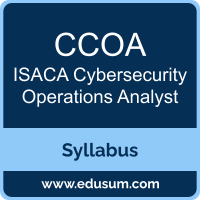 Use this quick start guide to collect all the information about ISACA CCOA Certification exam. This study guide provides a list of objectives and resources that will help you prepare for items on the ISACA Cybersecurity Operations Analyst (CCOA) exam. The Sample Questions will help you identify the type and difficulty level of the questions and the Practice Exams will make you familiar with the format and environment of an exam. You should refer this guide carefully before attempting your actual ISACA Certified Cybersecurity Operations Analyst (CCOA) certification exam.
Use this quick start guide to collect all the information about ISACA CCOA Certification exam. This study guide provides a list of objectives and resources that will help you prepare for items on the ISACA Cybersecurity Operations Analyst (CCOA) exam. The Sample Questions will help you identify the type and difficulty level of the questions and the Practice Exams will make you familiar with the format and environment of an exam. You should refer this guide carefully before attempting your actual ISACA Certified Cybersecurity Operations Analyst (CCOA) certification exam.
The ISACA CCOA certification is mainly targeted to those candidates who want to build their career in Cybersecurity domain. The ISACA Certified Cybersecurity Operations Analyst (CCOA) exam verifies that the candidate possesses the fundamental knowledge and proven skills in the area of ISACA Cybersecurity Operations Analyst.
ISACA CCOA Exam Summary:
| Exam Name | ISACA Certified Cybersecurity Operations Analyst (CCOA) |
| Exam Code | CCOA |
| Exam Price ISACA Member | $399 (USD) |
| Exam Price ISACA Nonmember | $499 (USD) |
| Duration | 240 mins |
| Number of Questions | 115 |
| Passing Score | 450/800% |
| Books / Training | CCOA Online Review Course |
| Schedule Exam | Exam Registration |
| Sample Questions | ISACA CCOA Sample Questions |
| Practice Exam | ISACA CCOA Certification Practice Exam |
ISACA Cybersecurity Operations Analyst Exam Syllabus Topics:
| Topic | Details | Weights |
|---|---|---|
| TECHNOLOGY ESSENTIALS |
- Identify the key components of computer and cloud networking, understand how databases, virtualization, and containerization are leveraged, and become familiar with command-line interfaces, programming, scripting, and more. A. NETWORKING
B–SYSTEMS/ENDPOINT
C –APPLICATIONS
|
25% |
| CYBERSECURITY PRINCIPLES AND RISK |
- Understand cybersecurity governance and alignment with business drivers, define cybersecurity strategy based on enterprise objectives, establish effective cross-organizational communication for cybersecurity and more. A–CYBERSECURITY PRINCIPLES
B–CYBERSECURITY RISK
|
20% |
| ADVERSARIAL TACTICS, TECHNIQUES, AND PROCEDURES |
- Understand common adversarial tactics, techniques, and procedures (TTPs), develop critical and creative thinking skills for threat detection and response, differentiate between dashboard events, attacker mindset insights and more. A–THREAT LANDSCAPE
B–MEANS AND METHODS
|
10% |
| INCIDENT DETECTION AND RESPONSE |
- Understand the importance of cybersecurity-incident preparedness, recognize the significance of incident detection and response in mitigating their impact, appreciate the role of proactive planning, practice, process refinement and more.
A–INCIDENT DETECTION
B–INCIDENT RESPONSE
|
34% |
| SECURING ASSETS |
- Understand the importance of designing countermeasures to protect digital assets, recognize the iterative nature of securing systems and their ecosystems, appreciate the holistic approach to securing assets, consider technical aspects and organizational products, services and critical business processes, and more.
A–CONTROLS
B–VULNERABILITY MANAGEMENT
|
11% |
To ensure success in ISACA Cybersecurity Operations Analyst certification exam, we recommend authorized training course, practice test and hands-on experience to prepare for ISACA Cybersecurity Operations Analyst (CCOA) exam.
